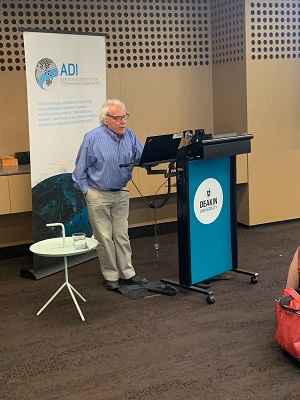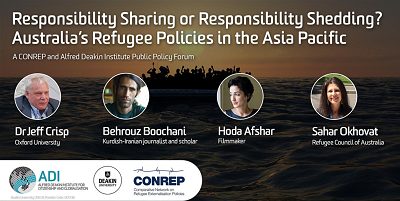Policy Forum: Australia’s Refugee Policies in the Asia Pacific
About this Event
The world is experiencing refugee movement on an unprecedented scale. To prevent refugees from reaching their territory, many wealthy democracies have adopted externalisation policies that restrict the ability of refugees to reach territory where they might seek protection under international law. Externalisation is a policy trend that is spreading throughout the world, and Australia’s policies in the Asia Pacific are at the forefront. Externalisation policies are built upon global power asymmetries and shift responsibility for refugee protection to states who can least provide it. At their most destructive, externalisation policies can prevent refugees from reaching safety; breach their human rights; and result, even, in death.
Dr Jeff Crisp (Refugee Studies Centre, Oxford University) presented the key address, titled ‘Global Refugee Policy: Where are we heading?’. The public address was followed by a panel discussion among three speakers who have had direct experience of the impact of Australia’s policies in the Asia Pacific: Behrouz Boochani, Sahar Okhovat and Hoda Afshar.

The film Remain, was also screened on the night. The film was made in collaboration with several of the men who still remain on Manus Island, PNG, five or more years after they left their homelands to seek asylum in Australia, but instead were sent to languish in the remote offshore detention centre. Comprising still and moving images, voice recordings and text, the work involves these men retelling their individual and shared stories through staged images, words, and poetry, and bearing witness to life in the Manus camps: from the death of friends and dreams of freedom, to the strange air of beauty, boredom, and violence that surrounds them on the island (Hoda Afshar).
An audio and visual recording of the public forum is available on the Policy Forum web page.
About the speakers

Dr Jeff Crisp is a specialist on refugee, migration and humanitarian issues. He has held senior positions with UNHCR, where he was Head of Policy Development and Evaluation, as well as the Global Commission on International Migration, the Independent Commission on International Humanitarian Issues, Refugees International and the British Refugee Council. Jeff has first-hand experience of humanitarian operations throughout the world and has published, lectured and broadcast extensively on refugee-related issues. He has a PhD in African Studies from the University of Birmingham. Jeff is currently affiliated to the Refugee Studies Centre in Oxford and Chatham House in London.
Behrouz Boochani is a Kurdish-Iranian journalist, scholar, cultural advocate, filmmaker and author. He holds positions as Adjunct Associate Professor in Social Sciences at the University of New South Wales, and as Visiting Professor at Birkbeck Law School. He was held as a political prisoner by the Australian government in Papua New Guinea for more than six years. His book No Friend but the Mountains: Writing From Manus Prison (Picador 2018) has received numerous awards including the 2019 Victorian Prize for Literature. Boochani has won an Amnesty International Australia 2017 Media Award, the Diaspora Symposium Social Justice Award, the Liberty Victoria 2018 Empty Chair Award, and the Anna Politkovskaya award for journalism. He is also co-director of the feature-length film Chauka, Please Tell Us The Time, a collaborator on Nazanin Sahamizadeh’s play Manus, and associate producer for Hoda Afshar’s video installation Remain. Behrouz graduated from Tarbiat Moallem University and Tarbiat Modares University, both in Tehran; he holds a Masters degree in political science, political geography and geopolitics Boochani is currently residing in New Zealand.
Sahar Okhovat is a Senior Policy Officer with the Refugee Council of Australia, the national umbrella body for refugees, people seeking asylum and the organisations and individuals who support them. Her work involves research, policy and advocacy on national and international issues impacting refugees and people seeking asylum. Sahar previously worked with Australian Red Cross as a caseworker and a team leader in Migration Support Program and later on as a Humanitarian Observer, monitoring conditions of immigration detention facilities. She holds a Master of Peace and Conflict Studies from the University of Sydney.
Hoda Afshar (born 1983, Tehran. Iran) lives and works in Melbourne. She is a visual artist and also lectures in photography and fine art. Hoda’s work has been widely exhibited locally and internationally and published online and in print. Her work is also part of numerous private and public collections. Through her work, she explores the nature and possibilities of documentary image-making. Working across photography and moving-image, she considers the representation of gender, marginality and displacement. Recent exhibitions includes Lahore Biennale (LB02) in Pakistan (2020), Remain, UQ Museum of Art in Brisbane (2019), Beyond Place, Museum of Photographic Arts, San Diego CA, USA (2019), Primavera 2018, Museum of Contemporary Art, Sydney and Waqt al tagheer: Time of Change, ACE Open, Adelaide (2018). In 2015, she received the National Photographic Portrait Prize, National Portrait Gallery and in 2018 won Bowness Photography Prize, Monash Gallery of Art, Australia. Hoda is represented by Milani Gallery in Brisbane.